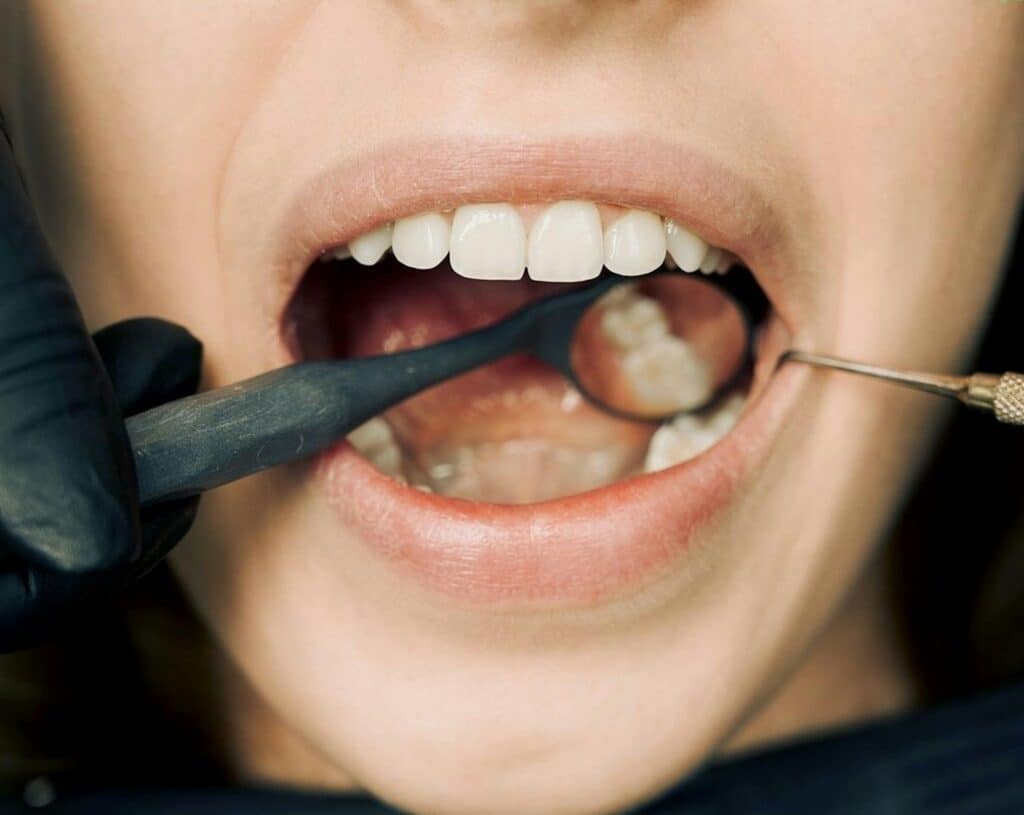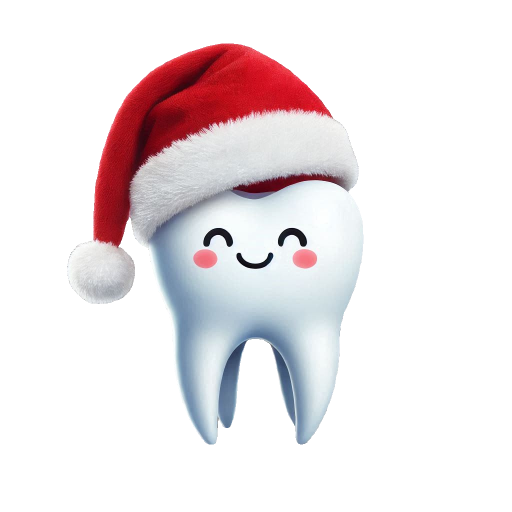Welcome to the realm of Dental Prostheses, where we explore the finest solutions for tooth loss.
What do we call a dental prothesis?
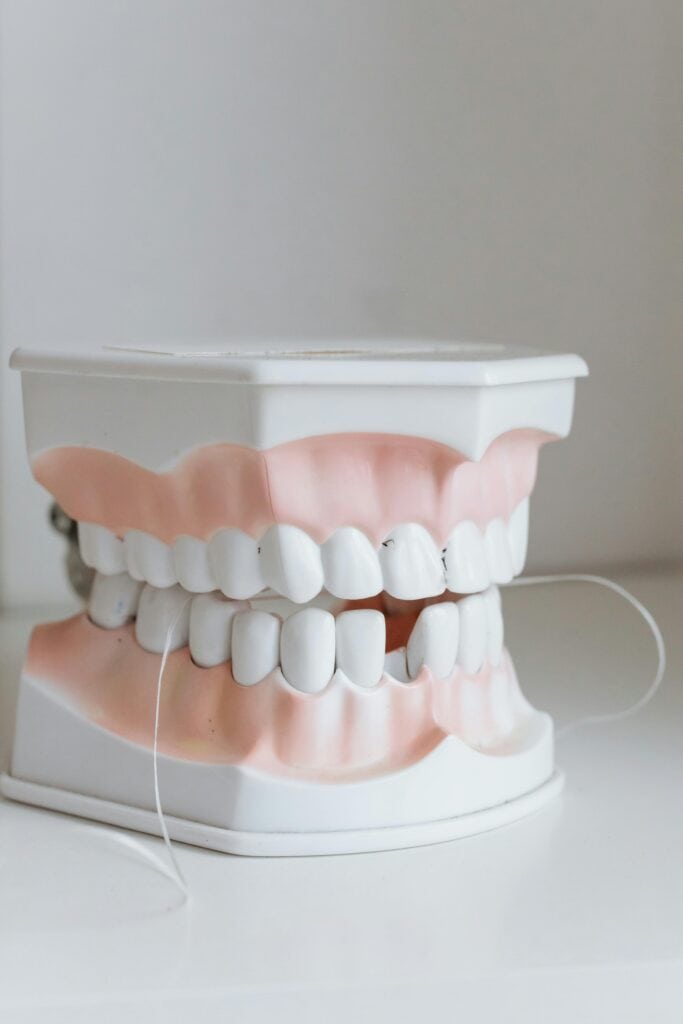 Dental prostheses fall into two main categories: fixed and partially removable or fully removable types.Fixed restorations are secured to teeth or implants, making them stationary within the mouth. In contrast, removable restorations are designed for more extensive gaps between teeth. They rely on existing teeth and implants for support while distributing biting force to the underlying bone covered with mucosa. With this type, daily removal is essential for thorough cleaning.
Dental prostheses fall into two main categories: fixed and partially removable or fully removable types.Fixed restorations are secured to teeth or implants, making them stationary within the mouth. In contrast, removable restorations are designed for more extensive gaps between teeth. They rely on existing teeth and implants for support while distributing biting force to the underlying bone covered with mucosa. With this type, daily removal is essential for thorough cleaning.
Fixed dentures
These dentures are suitable for teeth that meet specific quality, location, and stability criteria. They are not only used to replace missing teeth but are also often necessary for aesthetic purposes. Reasons for their use include crowded, aesthetically unpleasant, discolored teeth, or restoring the stability of root-treated teeth and their crowns. When utilized for larger gaps in teeth, they offer a fast and aesthetically pleasing solution but require preparing tooth material, potentially damaging adjacent teeth. It is vital to consider this when planning, as there are usually alternative options, such as using implants. A single-tooth restoration is known as a crown, while connecting multiple teeth to replace a missing tooth is termed a bridge.
In terms of material, they can be:
-Metal ceramics: This is the most basic and cost-effective dental restoration type. It features a metal frame core covered with natural porcelain applied layer by layer. The metal frame material is typically nickel-free cobalt-chromium alloy, occasionally gold alloy or titanium are used based on the specific indication.
-Zirconium: Often promoted as a metal-free alternative, zirconium dioxide is actually a metal alloy known for its white color. It is favored for its high aesthetic appeal, particularly in the front teeth region.
-Press ceramic: This metal-free option is recommended for individuals with metal allergies. It only consists of ceramic material strengthened through a special process. Besides crowns, it can be used for veneers aimed at enhancing aesthetics. Popular for achieving a "Hollywood" smile, it requires minimal tooth preparation, usually removing only the enamel's top layer. Press ceramics are durable, fitting precisely onto the tooth surface, especially suitable for front teeth.
-Bridge: A dental bridge is a solution for replacing missing teeth, employing dental crowns. While a crown replaces a single tooth, a dental bridge addresses multiple missing teeth. It can be tooth-supported or implant-supported, providing a comprehensive tooth replacement option.
Temporary dentures:
If there is a need for a denture, it typically takes a week to create. During this time, the teeth that are prepared are sensitive and delicate. This sensitivity can be especially problematic for front teeth aesthetically. It is advisable to have a temporary denture made for this brief period. These temporary solutions are cost-effective and allow for a normal lifestyle while waiting for the permanent denture.
Removable dentures, as mentioned earlier, can be taken out and put back in by the patient daily. They can be crafted for complete tooth loss, known as a prosthesis, or for partial tooth loss, referred to as a partial denture. In the case of partial tooth loss, they can be attached to teeth, fixed restorations, or implants.
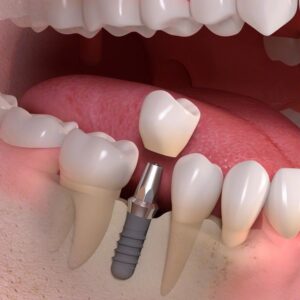 Dental Implants:
Dental Implants:
A specialised area of dental restorations focuses on implant dental restorations. Fortunately, in the 21st century, this has become a standard procedure.. This method effectively addresses the treatment of missing teeth at the end of a row or total tooth loss with fixed restorations, replacing partial or complete removable dentures. This transformation significantly enhances the quality of life for our patients. Often, this type of replacement is chosen to safeguard adjacent teeth from preparation and potential permanent damage, which can occur with alternative treatments.
Dental implant restorations are highly diverse and necessitate personalised planning. The entire process generally takes longer compared to bridges or partial or full removable restorations. Due to being a premium branch of dentistry, the cost of these replacements is understandably higher than other options. However, the improvement in quality of life is immeasurable.
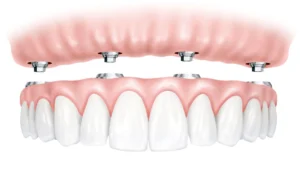 All-on-4®: A screw bridge restoration designed for four implants.
All-on-4®: A screw bridge restoration designed for four implants.
This approach offers a fixed solution instead of removable dentures or prostheses. Before employing the All-on-4 technique, we assess bone density using a 3-dimensional CT scan and select the most suitable implant size and type for the situation. This method proves cost-effective as only four implants are necessary per row of teeth, avoiding painful, lengthy, and expensive bone replacement. Patients benefit from a quick recovery time, enabling a swift return to their normal routine. The restoration enhances aesthetics, speech, chewing function, and denture comfort without a palate covering. The custom bridge prosthesis is removable only by the dentist, ensuring stability, aesthetics, and gum support.

